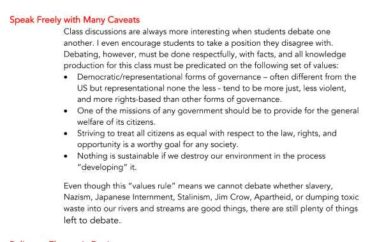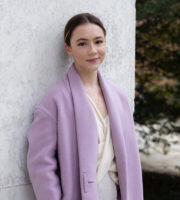
‘We cannot waste each other’s time relitigating the merits of a small handful of horrific social policies’
The syllabus for a Princeton University anthropology course this semester includes a policy that warns students against speaking openly and freely in the classroom on every subject.
The syllabus for the course, “Ethnography for Research and Design,” includes the subhead “Speak Freely with Many Caveats.”
The syllabus encourages students “to take a position they disagree with,” but states that “debating, however, must be done respectfully, with facts, and all knowledge production for this class must be predicated on the following set of values.”
The syllabus lists “respect for opposing points of view” as one of the “expectations” for the course, but does not specify what constitutes disrespect nor the consequences for violating the course’s free speech policy.
The class is taught by Director of Graduate Studies Carolyn Rouse, former chair of the anthropology department.
In a statement shared by Princeton Deputy University Spokesperson Michael Hotchkiss with The College Fix, Rouse wrote that teachers may impart implicit parameters around speech and knowledge production inside their classrooms.
“Why not expose the Wizard of Oz by making these rules explicit? My statement is about decorum, or the idea that we cannot waste each other’s time relitigating the merits of a small handful of horrific social policies,” Rouse wrote.
“Like the ‘Robert’s Rules’ for debate, this statement provides a basis for my very imaginative and fearless students to debate everything else, which is an enormous list that even includes my statement,” Rouse stated.
Free speech “caveats,” or values that cannot be debated, stated in the syllabus include:
“Democratic/representational forms of governance – often different from the US but representational none the less – tend to be more just, less violent, and more rights-based than other forms of governance.”
“One of the missions of any government should be to provide for the general welfare of its citizens.”
“Striving to treat all citizens as equal with respect to the law, rights, and opportunity is a worthy goal for any society.”
“Nothing is sustainable if we destroy our environment in the process of ‘developing’ it.”
“Even though this ‘values rule’ means we cannot debate whether slavery, Nazism, Japanese Internment, Stalinism, Jim Crow, Apartheid, or dumping toxic waste into our rivers and streams are good things, there are still plenty of things left to debate,” the section states.
But the “Speak Freely with Many Caveats” policy appears to enforce viewpoint-based restrictions on free speech that directly contravene the University of Chicago Free Speech Principles, which Princeton University formally adopted in 2015 by faculty vote.
“Princeton University fully respects and supports the freedom of all members of the University community ‘to discuss any problem that presents itself,’” according to the university “Rights, Rules, and Responsibilities” website outlining acceptable conduct.
“The University’s fundamental commitment is to the principle that debate or deliberation may not be suppressed because the ideas put forth are thought by some or even by most members of the University community to be offensive, unwise, immoral, or wrong-headed,” the policy states.
“Anthropology’s free speech policy is the same as the university’s,” João Biehl, chair of the anthropology department, wrote in an email to The College Fix.
The College Fix contacted the university to ask whether the ANT 302 course policy “Speak Freely with Many Caveats” contradicts the University’s policies set forth in “Rights, Rules, and Responsibilities.” Michael Hotchkiss referred The Fix to Rouse’s comment and stated the university “[does not] have anything else to add.”
Professor Robert George defends putting all of one’s convictions to the test
“All of us have convictions—including convictions we deeply cherish, convictions that shape our identities. A truth-seeker will not claim to have no such convictions,” Robert George, a Princeton politics professor and vocal defender of free speech, wrote in an email to The College Fix.
“Among the things that mark him or her as a truth-seeker, however, is that he or she will be prepared to put all convictions—even those most deeply cherished and identity-forming—on the table for rational scrutiny,” George continued. “I hope I never fall so deeply in love with my opinions that I prefer holding them to knowing that they are wrong and in need of revision or abandonment, if indeed they are partially or completely unsound.”
“What I learned from Plato—from Socrates—is that the best way for us frail, fallible, fallen human beings to make our way through this vale of tears without veering too badly off course is to love and honor truth above all else, even one’s most cherished convictions,” George stated.
MORE: Princeton uses Title IX to block student from covering anti-Israel protests: op-ed
IMAGE: Princeton University screenshot
Like The College Fix on Facebook / Follow us on Twitter






Please join the conversation about our stories on Facebook, Twitter, Instagram, Reddit, MeWe, Rumble, Gab, Minds and Gettr.